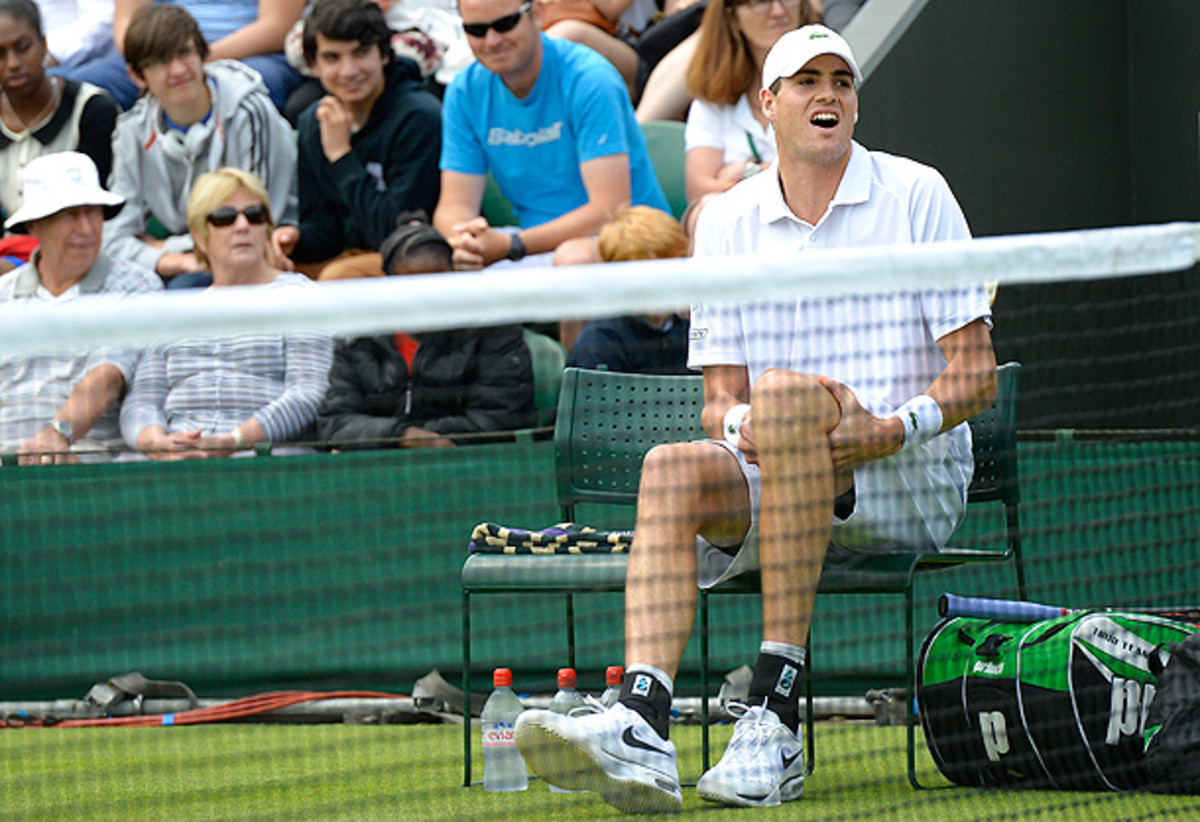
John Isner putting injuries behind him, looking ahead to U.S. Open
A leg injury cut short John Isner's Wimbledon. (Adrian Dennis/AFP/Getty Images)
It's been a start-and-stop kind of year for John Isner.
The 28-year-old opened the season ranked as the top American at No. 14, but he missed the Australian Open with a knee injury. Isner regained some confidence when he won the U.S. Men's Clay Court Championship in Houston in mid-April, but he struggled in the French Open lead-up and then retired in the third game of his second-round match at Wimbledon after sustaining a leg injury. He's slipped to No. 21, two spots below current U.S. No. 1 Sam Querrey.
Unfortunately, that milestone has lost some heft as of late. Andy Roddick's retirement, combined with Mardy Fish's absence and Isner's injuries and uneven play, has left the American men struggling to keep just one player inside the top 20 this year. The headlines were lousy at Wimbledon, where no American man reached the third round for the first time in more than 100 years. And seven weeks from now marks the 10-year anniversary of Roddick's U.S. Open title, the last time an American man won a major.
With myriad questions surrounding the state of U.S. men's tennis, all eyes will be on Isner this summer. He's set to play five consecutive weeks leading into the U.S. Open, beginning next week at the Atlanta Open as the U.S. Open Series starts. That's followed by the Citi Open in Washington, D.C.; the Rogers Cup in Montreal; the Western & Southern Open in Cincinnati; and his hometown tournament, the Winston-Salem Open, which takes place the week before the U.S. Open.
Is Isner the answer for American men's tennis?
Such a heavy schedule leading into the final Grand Slam tournament of the year isn't unusual for Isner. He played all five events in 2011, winning two of them, and went on to a quarterfinal loss to Andy Murray in New York, his best result at a major. In fact, Isner has done his best work on U.S. soil, where he's won five of his six titles and made six of his seven finals. Since the beginning of 2011, Isner is 66-22 in tournaments played in the States and 34-37 everywhere else.
"I just really enjoy it here," Isner said of playing in the United States. "I play a tournament in Atlanta that's so close to [the University of Georgia, where he attended college], which is awesome. I play another tournament in Winston-Salem, which is where I grew up. I play in D.C., where I've had such unbelievable memories [from making his first career ATP final, in 2007]. So these are tournaments that I've had good memories and I always seem to be at a happy place, and from that I tend to play my best.
"The surfaces do suit my game pretty well, but it's really me being pretty comfortable in the States. I feel like I've always been more relaxed in the States. ... I don't know what it is. It's something that I need to get better at. I need to start playing better in Europe."
Injury concerns have been swirling since his abrupt retirement at Wimbledon, so Isner was relieved to learn that the injury wasn't as bad as he feared. Initially thought to be a left-knee injury, Isner says the injury is actually to his quadricep muscle, which causes pain at the top of his knee. Isner called the trainer in the first set of his semifinal loss to Lleyton Hewitt at the Hall of Fame Tennis Championships last week, but he said that on the whole the injury hasn't hampered his preparation for the hard-court season.
Isner poses for ESPN The Magazine's Body Issue
"I've been working really hard on getting healthy, and getting stronger and doing everything necessary to nip this problem in the bud," Isner said. "I'm looking forward to putting it behind me. What happened at Wimbledon was really a freak injury. I don't know if I could have prevented it. I don't see how I could have."
As he looks forward to a grueling summer hard-court season, Isner has tried to avoid the pressure that comes with setting any personal goals. He's focused on staying healthy and said he won't enter a tournament unless he feels like he's physically ready.





